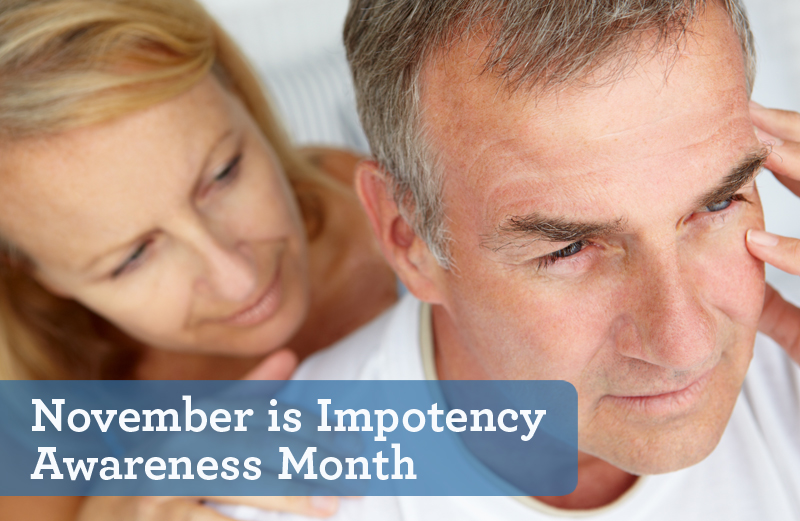Author: John Ludlow, MD
The month of November brings to mind Thanksgiving gatherings, turkey with all the trimmings, and too much pumpkin pie. But did you know that November is also National Impotency Awareness Month. Although it can be a difficult topic to talk about, gaining a better understanding of erectile dysfunction can help you determine whether there may be a simple solution available—or if a more serious health issue may be involved.
What is erectile dysfunction?
According to the Urology Care Foundation, erectile dysfunction (ED)—also referred to as impotence—affects around 30 million men in the U.S. and is the most common sex problem that men report to their doctors. This condition is defined as the inability to get and keep an erection firm enough for sexual activity.
When sexual arousal occurs, chemicals are released that increase blood flow to the penis, which makes the penis firm, resulting in an erection. Since blood flow plays such an important role in this process, conditions which may impair blood flow can contribute to ED.
Symptoms of ED include:
- Trouble getting an erection
- Trouble keeping an erection
- Reduced sexual desires
Although ED can be frustrating and discouraging when it occurs, occasional instances shouldn’t necessarily be a cause for concern. However, ongoing ED may a sign of a more serious health issue.
What causes erectile dysfunction?
Since ED is affected by blood flow, it can be considered a vascular condition and is sometimes associated with other vascular conditions, such as heart disease. In fact, men who experience ED may be at higher risk for vascular events, such as heart attack and stroke.
Risk factors for ED include:
- Heart disease
- High blood pressure
- Diabetes
- Obesity
- Atherosclerosis
- Metabolic syndrome
- Parkinson’s disease
- Multiple sclerosis
- Low testosterone
- Scar tissue inside the penis
- Certain prescription medications
- Tobacco use
- Alcoholism and other substance abuse
- Treatments for prostate cancer or enlarged prostate
- Surgeries or injuries affecting the pelvic area or spinal cord
Although blood flow plays a big part in sexual arousal, the brain plays a role, too. For this reason, psychological issues can also cause ED or make it worse. Examples of such issues include:
- Stress
- Fatigue
- Depression
- Anxiety
- Other mental health disorders
- Relationship Problems
What solutions are available?
Although ED can be quite troublesome for those who experience it, the good news is that there are many treatment options available, including oral medication and medical equipment or procedures. An oral medication is often the first line of treatment for healthy patients with ED. Medications include:
- Viagra
- Cialis
- Levitra
- Staxyn
If using an oral medication isn’t an option, medical equipment and procedures may be recommended. These include:
- Vacuum erection device
- Penile injections
- Internal penile implant
In the following video, Dr. John Ludlow of Western Michigan Urological Associates discusses erectile dysfunction and treatment options that are available.
If you or someone you love is dealing with the symptoms of ED, we at Western Michigan Urological Associates can help by providing the care you deserve. Please contact us today to make an appointment with one of our physicians.


